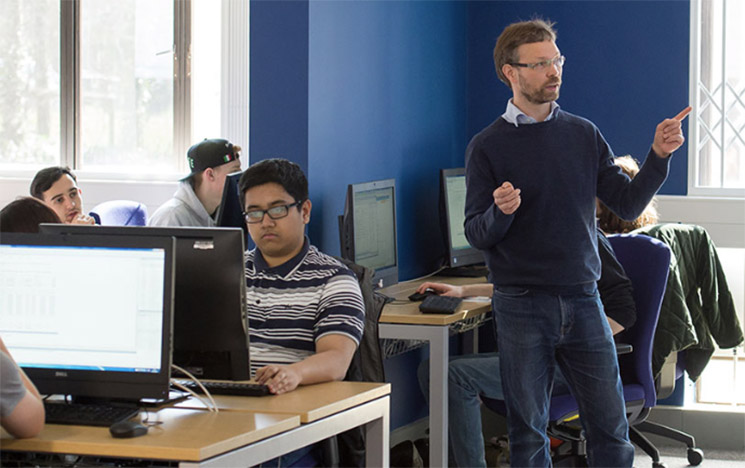Summer School: Economics
Spend your summer at our EQUIS and AMBA accredited Business School. If you're unsure what to study this summer, follow our top tips for how to choose a module.

Browse our modules
The modules outlined below were offered for Summer School 2022 and are indicative of the type of modules that may be offered for 2023. Register your interest and we will be in touch once we have confirmed which modules will run next summer.
Session One
27 June - 15 July 2022
- Principles of microeconomics
Module code: IS438
This module introduces students to the key principles of microeconomic analysis. It starts with an overview of scholarly perspectives on the relationship between business and society.
It goes on to cover the basic tools of economic analysis including opportunity cost, demand, supply, elasticities, and consumer and producer surplus. It introduces students to the theory of the firm and the analysis of the effects of different market structures on economic welfare.
Upon completing the module students will be able to evaluate the effect of a range of proposed policy changes (such as governments changing tax policy, or companies changing pricing strategies) on economic outcomes (such as household welfare or business profits).
This module draws inspiration from the economics department’s award winning “L1028: Introduction to Economics”. It leverages the excellent teaching and learning resources developed for that core module and makes it suitable for a more general course such as the Summer School.
Learning outcomes:
- Demonstrate knowledge of the core principles of microeconomics
- Be able to use the power of abstraction to focus upon the essential features of a microeconomic problem
- Provide a framework for the evaluation of changes in economic policy or other exogenous events as they relate to households and firms.
- Communicate microeconomic ideas, concepts and information using means of communication appropriate to the audience and the problem at issue.
Teaching method: Seminars, lectures and workshops
Assessment: Computer-based exams, unseen exams (in-class)
Contact hours: 40 hours
Credits: 15 Sussex Credits
Session Two
18 July – 5 August 2022
- Principles of macroeconomics
Module code: IS439
This module introduces students to the key principles of macroeconomic analysis. Students are exposed to recent empirical analysis of the distribution of economic growth across the world.
The observed patterns of material wellbeing and deprivation across the world motivate a discussion of a range of contemporary theories of economic growth. These theories are discussed against a backdrop that critically analyses GDP as a measure of economic and social progress.
The module goes on to present the tools for the analysis of fiscal policy, monetary policy, exchange rate policy and open economy macroeconomics.
This module draws inspiration from the economics department’s award winning “L1028: Introduction to Economics”. It leverages the excellent teaching and learning resources developed for that core module and makes it suitable for a more general course such as the Summer School.
The module learning objectives are designed to align with the needs of students on a wide range of degrees.
Learning outcomes:
- Demonstrate knowledge of the core principles of macroeconomics.
- Be able to use the power of abstraction to focus upon the essential features of a macroeconomic problem
- Provide a framework for the evaluation of changes in economic policy or other exogenous events as they relate to macroeconomic indicators such as growth, inflation, output and unemployment.
- Communicate macroeconomic ideas, concepts and information using means of communication appropriate to the audience and the problem at issue.
Teaching method: Seminars, lectures and workshops
Assessment: Computer-based exams, unseen exams (in-class)
Contact hours: 40 hours
Credits: 15 Sussex Credits
Not sure how to choose?
Follow our top tips for choosing your modules. You can also find out about our teaching structure, assessment process and how your credits transfer back to your home institution.
Find out more.
Which school will I study in?
You'll study in the Department of Economics which is part of the University of Sussex Business School.
Some of our expert academic staff consult for leaders in business and government – and this real-world experience informs our teaching.
Find out more.
Our economics research
Staff at Sussex are influencing decision makers, creating new models for trade and improving financial services to small and medium-sized enterprises (SMEs).
Our research influences the way we teach, and you learn from academics at the forefront of their fields.
Find out more.
Contact us
If you are studying at Sussex for a summer and have questions, email summer@sussex.ac.uk.